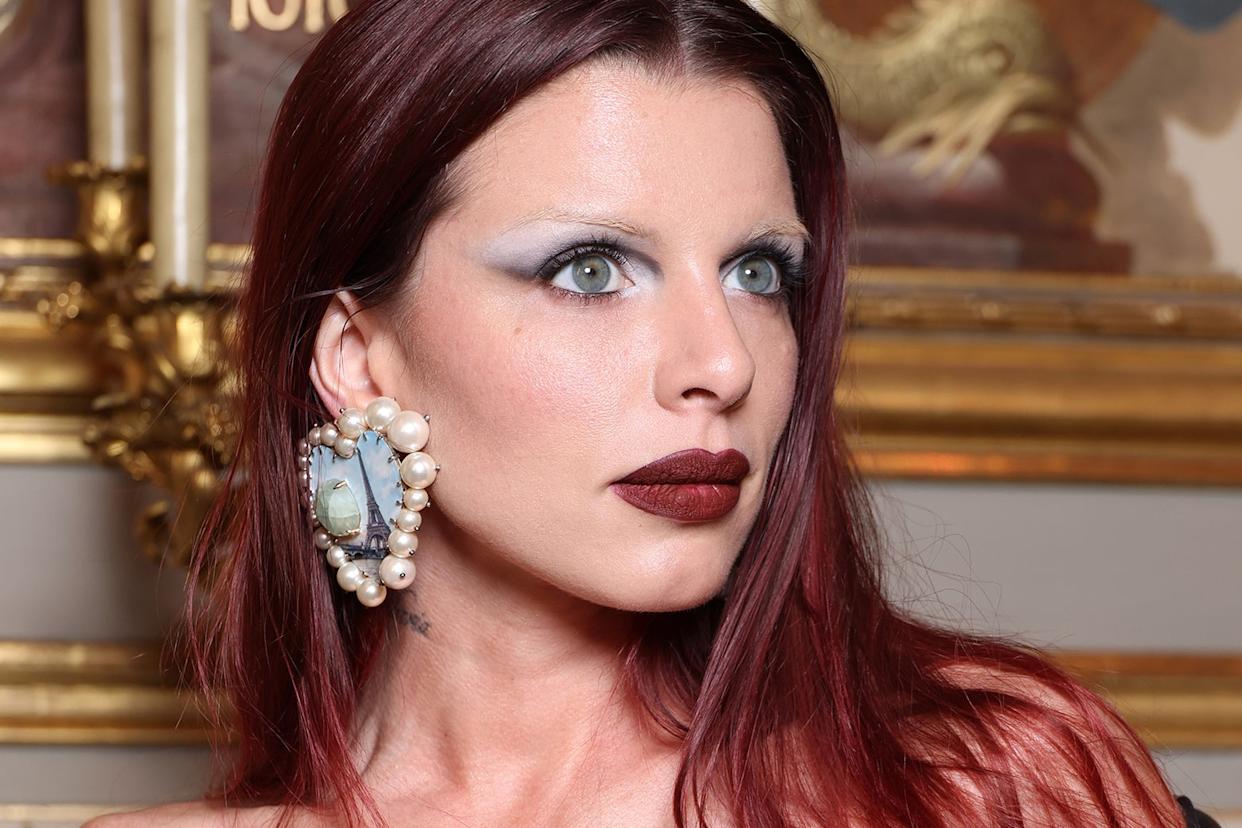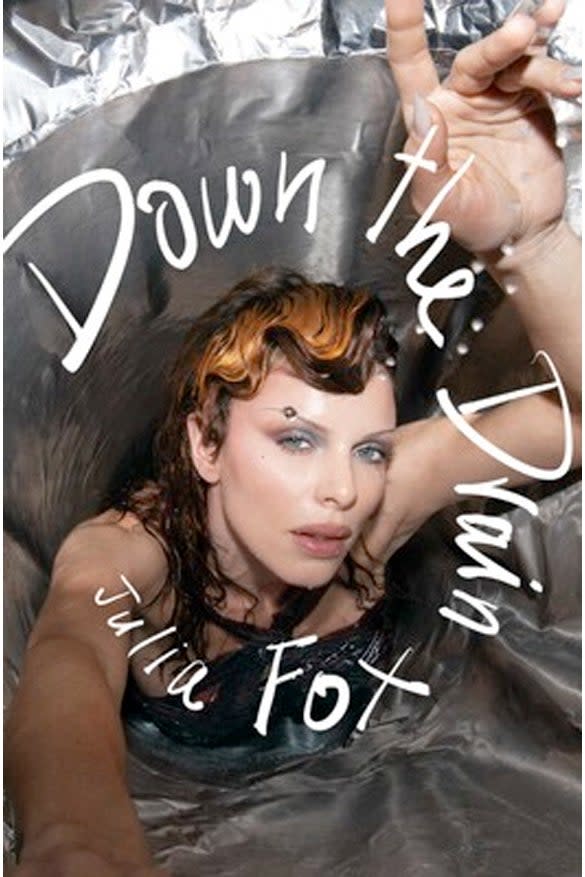What Is Julia Fox—It Girl, Kanye Ex, Uncut Gems Star—Famous For? Her Memoir Offers a Hint.

- Oops!Something went wrong.Please try again later.
A common complaint about people who are still young writing memoirs is: What’s the point? How much could they have to say about life when they’ve hardly got started? But nobody could make this objection about Julia Fox, the edgy fashion it girl and actress best known for her role in the 2019 Safdie brothers hit Uncut Gems (“Uncah Jahms”) and for her brief relationship with Kanye West.
Fox, who came up on the Manhattan downtown scene as a model, clothing designer, artist, and general woman about town before her feature film debut catapulted her into the larger spotlight, is a celebrity in the purest distillation of the word. She is not a movie star, exactly; although her Uncut Gems role was a breakout, she has appeared in only a few productions since. Nor is she just a socialite or a professional muse, although she certainly appears in the tabloids as often as one. She makes headlines and raises eyebrows for her outfits. She has courted controversy and won admiration in equal measure. She has been profiled in some of the biggest publications, from New York Magazine to the New York Times. She is famous, but for what, precisely? For nothing, anything, everything—if there’s a person who’s a better representative of fame in 2023, I don’t know who it is.
Now, Fox—who has lived eight or nine years’ worth of chaos by the time you’ve sat down for lunch—has put it all on the page for us to pore over. She published her memoir, titled Down the Drain, in October, sparking a fresh round of press to accompany the book’s release. The book jacket features full-bleed photos of Fox: On the front, she appears to be circling a drain in a full face of makeup, and on the back, she is standing, thigh muscles rippling, in a huge black latex cloak and a black thong with straps that go up over her shoulders. As is befitting of her brand, she looks amazing.

In the book, we learn that the glamour that people now associate with Fox is a long way from where she started in life. As a child shuttling back and forth between New York, where her dad was from, and her mother’s Italian hometown, she was often homeless, neglected and abused by warring parents, and frequently abandoned by the friends’ families she would hitch herself to. Her first background role in a film came when she was a preteen, but the movie was put on hold when the producer murdered the director. She had her tongue pierced before the end of seventh grade, was a master shoplifter by middle school, and got the name of an early boyfriend tattooed on her wrist the same night they met. Things only get more intense from there. In one passage, Fox has a miscarriage in the toilet of a bar without knowing she was pregnant, gets back at a fellow dominatrix who peed on her clothes in the dungeon where she works by pouring an enema bag of her own excrement into her locker, and overdoses on various substances multiple times.
It is a wild, unrelenting ride. I wouldn’t recommend reading it in big chunks, as I did, which made me feel like I needed a brisk walk around the block or a cold compress. It’s written in the present tense, with the young Fox lurching from club bathroom to pavement to drug den to hospital wing to dungeon to tattoo parlor to courtroom, dragging you along with her. It’s probably intentional, this feeling of hydroplaning in her passenger seat. If it’s shocking tell-all revelations you’re looking for, you’ll get them in shovel-loads.
Fox admitted in an interview with the New Yorker that the book wasn’t edited, and you can unfortunately tell. There are tautologies, clichéd descriptions, clunky phrases, and even instances of dubious vocabulary (“confliction”), which would all have been easy work to scrub out, had anybody been tasked with doing so. But I don’t want to be too unfair about this: The fault here, to my mind, lies with her publishers, not with her. What’s more interesting than the lack of polish is what sort of picture of Fox emerges from this unvarnished account of her life, underneath the off-the-rails antics and struggles with poverty and abuse. What picture of herself does she want us to see?
Fox, as she recounts, repeatedly gets drawn into the orbit of awful, controlling men who get to dictate who Julia Fox is allowed to be. A sugar daddy has her trailed by a private investigator, the man she loses her virginity to in Italy tells the whole town she’s a whore, various boyfriends shove her up against walls and dictate who she is allowed to speak to. But she refuses to cast herself in the role of the victim in these situations. She kicks and screams and steals and lies to get what she can get out of these men, and she doesn’t apologize for it. It’s refreshing. The message is that she doesn’t give a fuck what people think of her. “I was ridiculed for being different and for doing whatever I had to do to survive,” she writes. She’s Julia Fox, doing what she wants, and what she has to do, to get ahead.
But there are other parts of the memoir that betray a desperation for respect and admiration. She reports people telling her that “everyone is obsessed with you.” She claims to have single-handedly started “every trend of 2022” (a citation may be needed there). In her telling, she charms and dazzles people wherever she goes, claims that her childhood poetry was good enough that her father managed to get her words published in poetry journals more than once, and tells us that an interview with her was the most clicked-on article in the history of one magazine’s website. She brags, essentially, and we’re left to believe her in all her incandescence.
I suppose, in its way, the conflict between these two voices—the one that wants us to see her as someone who doesn’t care what we think, and the other one that seems to care a lot—is an honest register, and one that comes through in the contrasting reactions to everything that Fox puts out into the public. “I’m an artist in the role of a lifetime, playing Me,” reads one line late on in the book. Fox, whether as an actor, a dominatrix, or a “hood celebrity,” as she calls herself, has always been putting on an act. But despite the fact that she is obviously still engaged in creating the performance artwork that is herself, what comes out of this book is also the sense of a real, complex person. For all the book asserts that Julia Fox is not like us, it turns out that, at root, she is. She doesn’t give a fuck, but she does. Don’t we all?

